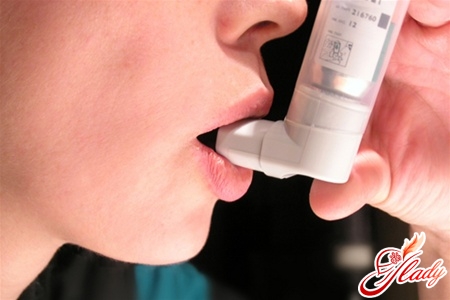
Allergic asthma isa type of upper respiratory tract disease and is the most common form of asthma. Moreover, this form of the disease affects not only adults, but also children. Even common bronchial asthma can be accompanied by allergies, which significantly worsens the situation and aggravates the symptoms.
General characteristics of the disease
Bronchial asthma itself manifests itself inin the form of asthma attacks that interfere with normal life. Improvement occurs only with regular use of medications and constant monitoring by specialists. Of course, the symptoms are affected by the form of the disease, timely treatment can significantly improve the patient's condition. Infectious-allergic or bronchial asthma begins to develop when an allergen enters the respiratory tract. The body's immune defense is quite sensitive to various foreign substances, so it makes the muscle tissue of the tract contract sharply. This phenomenon is called bronchospasm. At this point, the inflammatory process begins and the tract is filled with fairly thick mucus. This leads to the appearance of the most frequent and widespread symptoms: sneezing, watery eyes, a feeling of nasal congestion, and slight discharge from the nasal passages is possible. There are several groups of allergens that cause unpleasant reactions. Non-infectious allergens - These are pollen, dust, fluff, various insects, food products, chemical substances found in the atmospheric layers. This group also includes medications that cause unpleasant symptoms when taken. The most common allergy-causing substances are iodine-containing drugs, analgin, acetylsalicylic acid, antibiotics, novocaine, antiviral vaccines, antispasmodics, serums and other substances. Infectious allergens include frequent chronic infections and inflammatory processes in the body. Asthma (allergic or bronchial) is often aggravated by a hereditary factor. As a rule, the risk of a child developing the disease increases by 40% if at least one parent has an allergy and asthma. Moreover, it is not infectious-allergic bronchial asthma itself that is inherited, but the vulnerability of the body and its immune defense to the occurrence of allergic reactions of various types. It is advisable to carry out preventive measures and start treatment in time if the first symptoms appear.
Main Risk Factors
To start the correct treatment, it is necessarydetermine not only the symptoms of the disease, but also the form of asthma, its characteristics, causes of occurrence and other factors. As a rule, the main risk factors are considered to be chronic respiratory diseases, infectious diseases, unfavorable environmental conditions, bad habits (in particular, smoking tobacco products), harmfulness of the profession, long-term use of certain types of medications. Moreover, passive smoking can often be the cause. Allergies and asthma are quite closely related. It should be noted that the initial symptoms of different forms of the disease are quite different from each other, but a more advanced process develops according to a similar mechanism. In atopic asthma, the main catalyst is a certain allergen or group of allergens. A single contact with such a substance causes a fairly strong allergic reaction. Repeated contact is additionally complicated by narrowing of the bronchi and difficulty breathing. These are the most common and obvious symptoms that require immediate selection of high-quality and effective treatment. Allergic asthma with further contact with the allergen manifests itself almost instantly, and without contact the person's condition stabilizes. It is at the moment of suffocation that special medications are required (the main treatment for asthma), otherwise the attack may end in death. If asthma, which appears against the background of weakened immunity, is not treated in a timely manner, the form of the disease becomes more severe, pathogenic changes in the respiratory organs often occur, the mechanism of work is disrupted, and a variety of infectious diseases join in. Infectious-allergic asthma is typical for older people, so it is almost never found in children. Chronic infections lead to the fact that the respiratory organs are sensitive to irritants. At the slightest contact, the functions of the bronchi are disrupted, which leads to a fairly serious condition of the person. Only effective treatment helps to alleviate symptoms and gradually restore the body.
Effective treatment of bronchial asthma
To properly treat asthma, firstit is necessary to determine the group of allergens that cause these reactions. As a rule, effective treatment consists of using medications that must be combined with procedures to improve the health of the body and enhance immune protection. If an allergy has arisen against the background of bronchial asthma, then the first thing to do is to remove these unpleasant consequences. For this, antihistamines are used that do not have a sedative effect. To improve respiratory function, special nasal sprays are used to expand the ducts. Of course, treatment is selected only by an experienced immunologist, who must carefully examine the patient, study the nature of the disease, identify the main factors and characteristics of the body. In no case should steroids or inhalers be taken without a prescription, since some substances lead to an even sharper reaction of the body, which often leads to suffocation and death of the patient. People who are predisposed to this kind of disease should protect themselves from contact with sick people and possible allergens. This will prevent attacks and aggravation of the condition. Undoubtedly, increasing immunity has a positive effect on the course of the disease and the duration of treatment. Some clinics offer modern treatment developed in several stages. At the first stage, the effect of the identified allergen is stopped, at the second - complex treatment is carried out, which leads to the formation of blocking antibodies in the body to increase the protective function. Asthma and allergy are close concepts. In the pocket of every person with diseases of the upper respiratory tract there should be specially selected drugs that may be needed at any time. This is due to the fact that it is impossible to constantly prevent contact with the allergen and lead a normal lifestyle.
Preventive actions
If the causative agent is due to whichan allergy occurs, there is dust, then it is advisable to carry out frequent wet cleaning in the room to eliminate the source of the reaction. The reaction to plant pollen requires the exclusion of any indoor flowers in the house. The patient should open windows less often during the flowering period, avoid public places with an abundance of various plantings and plants, when inhaling the aromas of which asthma appears. Allergies cause sudden changes and negative consequences. Of course, effective treatment is possible only if all the doctor's requirements are met. But it is wiser to prevent the onset of the disease than to select drugs to eliminate the symptoms later. The main emphasis should be on improving immunity. To do this, a person should be in the fresh air, regularly exercise, eat a balanced diet, take vitamin complexes during the period of vitamin deficiency (spring, autumn), and treat various diseases (infectious, colds) in a timely manner. During seasonal exacerbations (for example, during the flowering period of plants), which accompany bronchial asthma with allergies, it is advisable to regularly ventilate the room, use air filters, air conditioners, and avoid prolonged stay with the source of allergies. As a rule, you need to remove objects that accumulate dust from the room. These can be carpets, soft toys. It is recommended to wash clothes and bed linen more often, using hypoallergenic detergents. A certain level of humidity should be maintained inside the room. Too dry and too humid air is not suitable for people with allergies. To optimize the microclimate, air conditioners, humidifiers, ionizers are installed, which remove harmful particles (dust, animal hair, plant pollen) and enrich the air with useful substances. The living space must be kept clean. This is especially true for the bathroom and kitchen, where mold appears with high humidity and rare cleaning, which causes quite severe allergic reactions and is very dangerous for the human body.








